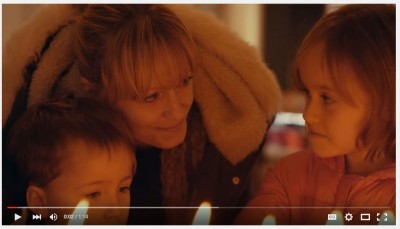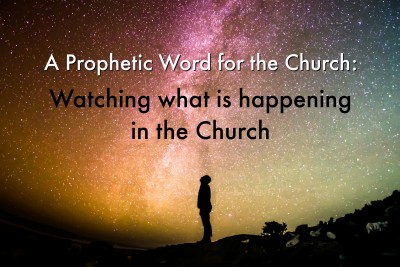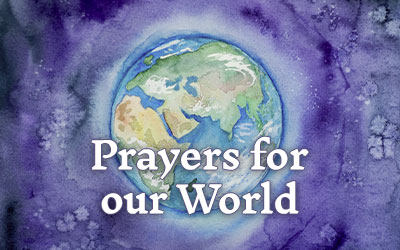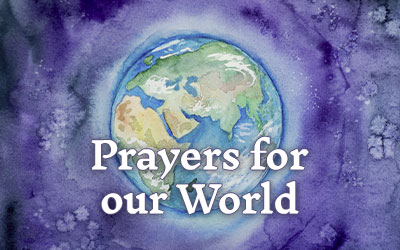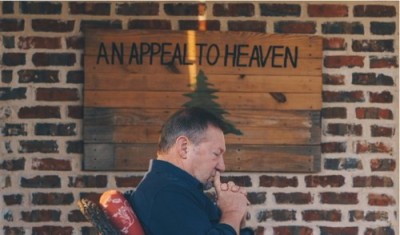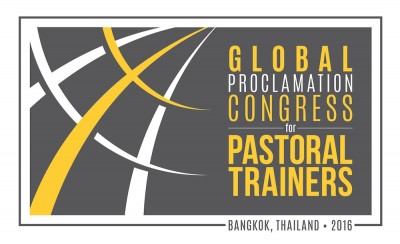Turkey: Syrian refugees’ ‘slave labour’
08 Apr 2016‘I am a maths teacher with twenty years’ experience, but no Syrian schools in Istanbul will hire me.’ Ali arrived from Syria with $6,000. Unable to find a teaching job in Turkey, he now works 11-hour days, six days a week, for 1,000 Turkish lira. He pays 800 lira rent, and 200 lira utilities. To get by, his two sons, 12 and 14, work 11-hour days in a sweatshop where they earn 500 Turkish lira each per month. ‘I don’t want to be rich,’ he said, ‘but I’ve lost hope.’ All that is left of Ali’s life savings is 50 Turkish lira. 85% of Syrians in Turkey living outside refugee camps try to join the unofficial workforce due to lack of work permits. Turkish employers take advantage of low-cost refugee labourers who earn half the normal wages. ‘The salary is not enough but it’s better than nothing.’ Ali said.
Finding out about Jesus
06 Apr 201624-7 prayer can transform your church
05 Apr 2016In the run-up to Thy Kingdom Come, the week of prayer called for by the Archbishops of Canterbury and York, an encouraging number of churches are considering hosting 24-7 prayer rooms, many for the first time. Some prayer rooms will be held across a rural benefice or deanery, others in larger churches or with sisters and brothers from other denominations and streams. There'll even be a dedicated prayer room at the heart of Lambeth Palace, the home of the Archbishop of Canterbury.
A round the clock prayer room for a week or weekend can sound a daunting prospect, but one Vicar shares the story of when his rural deanery hosted one for the first time, "I was a bit hesitant doing it as an individual church as it's a lot of hours, but we divided it up and it was amazing. It released all sorts of things in our church and it felt like a spiritual blockage was removed. I shouldn't be surprised that 24-7 prayer had such an effect, but how it changed our church did surprise me. This year we are doing it as a Deanery and with ecumenical friends. We'll be using the 24-7 prayer facility [online] which allows people to book slots easily."
To watch the full video go to https://youtu.be/7vvBpxrrwXY
The Thy Kingdom Come contains links to all you need to setup a room, with full details here: http://thykingdom.co.uk/planning-your-prayer-room The Archbishops are delighted to be partnering with 24-7 prayer to offer their online booking and registration resource, without charge, here: http://www.24-7prayer.com/prayerrooms (requires free registration then click on 'register prayer room').
If you are planning on hosting a prayer room please do register on the website so we can all be encouraged. You can also register your e-mail address to receive information from the Archbishops about Thy Kingdom Come here: http://thykingdom.co.uk/#sign-up-section
Prophetic Word for the Church - Malcolm Duncan
04 Apr 2016In March 2016, the World Prayer Centre hosted the WATCHING 2016 national prayer conference at The Hayes conference centre in Swanwick, Derbyshire. Over 240 people gathered for powerful time of seeking God, prayer, being equipped and released with fresh vision and prayer strategy.
Rev Malcolm Duncan of Goldhill Baptist church was our guest speaker for the third year. It was a time of envisioning, watching and hearing what the Lord is saying in these times. We also hosted four workshops as part of the conference, which were to equip people in prayer, evangelism and the prophetic.
Malcolm Duncan brought a significant prophetic word to the Church in these Islands at our conference. It builds on important words spoken by Smith Wigglesworth (1947) and Jean Darnell (1967) of God's call on Great Britain. We feel that it is right to release this Word to the wider Church.
Get Malcolm's Word
- You can download the transcript of Malcolm's prophetic word.
- Listen to the podcast of his word in the session – Watching what is happening in the Church, the final one of a series of talks on being a watchman.
- Download the original prophetic words from Smith Wigglesworth and Jean Darnell which are mentioned in the session.
Please study this word, pray into it and to bring it into Father's presence. Feel free to share it prayerfully with others. Ask the question, "Lord, what are you calling me to do? Show me your heart for my town/neighbourhood/workplace/ community". We are being called to get ready – and come before God in repentance, dependence and authenticity.
Join us in praying, "Come Holy Spirit, in power, grace, and holiness – I open myself to you. Use me, prepare your church and change this nation. Amen"
The World Prayer Centre team
I am writing to you with an urgent plea. I am at the United Nations headquarters in New York, where two important UN documents are being considered (“Agreed Conclusions” and a resolution on HIV/AIDS) at the UN Commission on the Status of Women.
Both documents are filled with proposals calling for controversial sexual rights and for radical sexuality education for even very young children.
Intense negotiations on these documents are underway right now.
To help counteract these threats to families and to children everywhere, we are premiering our powerful new documentary here at the UN this week to expose the radical agenda to sexualize children.
We are also launching an online letter campaign calling upon UN Member States to stop this dangerous agenda here and now.
We only have this week to get as many signatures as possible on our letter to UN Member States in order to stop this agenda that will harm children worldwide.
You can easily sign the letter here.
Releasing our new documentary, “The War on Children: The Comprehensive Sexuality Education Agenda,” that exposes the dangers of CSE is perhaps the most important action Family Watch has ever undertaken. The documentary is shocking and extensively documented, and it needs to be broadcast everywhere!
You can view the documentary online, either a 10-minute version or the full version.
As revealed in this new documentary, as far back as 1999, the UN agency UNICEF published a manual that even promoted bestiality and sex with non-consenting persons as situations where teens could derive sexual pleasure.
If this was taught to children in 1999, can you imagine what they want to teach your children in 2016? This and more is revealed in this new documentary.
Understand that the UN agencies and liberal Western countries pushing this radical sexuality education are more aggressive and are using more deceptive tactics than ever before.
To advance CSE they claim it will delay sexual debut, stop HIV, prevent teen pregnancy, lift people out of poverty, prevent sexual abuse, promote gender equality, and more. This is far from the truth. Instead, CSE encourages children to engage in high-risk sexual behaviors, to experiment sexually, to question their sexual orientation and their gender identity.
We simply cannot let CSE be adopted in any UN, national, state or local policy! Ever.
Therefore, we urge you to help by taking the following steps right now:
- Please watch either the 10-minute version or the 35-minute version of the documentary right now so you can see just how bad this really is. Even though watching the CSE material that is exposed can be disturbing, it is essential for everyone to understand what is being taught to our kids and what we are up against so we can stop it.
- Go to our website, StopCSE.org, and sign the letter calling upon the UN to stop promoting or funding CSE. We will be sending a copy of this letter with signatures from around the world to the UN Member States that are negotiating two important documents right now.
- Forward this alert on and encourage as many people as you can to watch the documentary and sign the letters as well. Consider sending it to your local media contacts, church and community leaders, or heads of organizations that would help disseminate this and especially to school administrators in your area…
Every minister of education, every parent and grandparent, every teacher, every school administrator, and every policymaker need to see this documentary so they can help protect children and our societies from this harmful agenda.
Please help us spread this information as far and wide as possible by forwarding this alert on to others.
Together we can and will protect the world’s children!
In addition, please encourage people to sign the letter to the UN. These signatures will make a tremendous difference in putting an end to the harm being perpetuated against children.
We will let you know what happens when we show this shocking documentary on Wednesday, March 23, at the UN here in New York!
Sincerely,
Sharon Slater
P.S. Go to STOPCSE.org for documentation on the harmful CSE agenda
In an attempt to “preserve history,” two exact replicas of the 50-foot arch that stood at the entrance to the temple will be erected in April 2016 in Times Square in New York City and in Trafalgar Square in London. (Reuters)
Join us on our podcast each weekday for an interesting story, well told, from Charisma News. Listen at charismapodcastnetwork.com.
I realize that the headline of this article sounds like it must be false, but it is actually completely true. The Temple of Baal (also known as the Temple of Bel) was a world-famous landmark that was located in Palmyra, Syria. In August 2015, this temple was destroyed by ISIS, and most of the world recoiled in terror at the loss of a “cultural heritage site.”
In an attempt to “preserve history,” two exact replicas of the 50-foot arch that stood at the entrance to the temple will be erected in April 2016 in Times Square in New York City and in Trafalgar Square in London. Needless to say, a lot of people are quite disturbed by this. In ancient times, child sacrifice and bisexual orgies were common practices at the altars of Baal, and now we are putting up a monument of worship to this false god in the heart of our most important city.
When I first came across this story, I could hardly believe it. But this is not just some Internet rumor. This was reported by the New York Times.
NEXT month, the Temple of Baal will come to Times Square. Reproductions of the 50-foot arch that formed the temple’s entrance are to be installed in New York and in London, a tribute to the 2,000-year-old structure that the Islamic State destroyed last year in the Syrian town of Palmyra. The group’s rampage through Palmyra, a city that reached its peak in the second and third century A.D., enraged the world, spurring scholars and conservationists into action. Numerous nongovernmental organizations are now cataloging and mapping damaged cultural heritage sites in the region.
Of course, most nonreligious Americans don’t understand who Baal was, nor do they really care.
But the truth is that many of the elements of ancient Baal worship are being mirrored in our society in 2016. The following is an excerpt from an excellent article by Matt Barber:
Ritualistic Baal worship, in sum, looked a little like this: Adults would gather around the altar of Baal. Infants would then be burned alive as a sacrificial offering to the deity. Amid horrific screams and the stench of charred human flesh, congregants—men and women alike—would engage in bisexual orgies. The ritual of convenience was intended to produce economic prosperity by prompting Baal to bring rain for the fertility of “mother earth.”
The natural consequences of such behavior—pregnancy and childbirth—and the associated financial burdens of “unplanned parenthood” were easily offset. One could either choose to engage in homosexual conduct or—with child sacrifice available on demand—could simply take part in another fertility ceremony to “terminate” the unwanted child.
Modern liberalism deviates little from its ancient predecessor. While its macabre rituals have been sanitized with flowery and euphemistic terms of art, its core tenets and practices remain eerily similar.
So considering the child sacrifice and sexual immorality that we are engaged in today, perhaps it is only natural for us to have a Temple of Baal in Times Square…
Michael T. Snyder is the publisher of The Economic Collapse Blog and author of The Beginning of the End.
http://www.charismanews.com/us/56060-temple-of-baal-will-be-erected-in-times-square-next-month
“The Year of Joel 2:16”
Dutch Sheets, Dallas, TX
As we have heard from many prophetic voices, the year 2016 is full of promise for seeing a great turning in America. At the start of the year, the Lord also spoke to me about this season we have stepped into, telling of spiritual recalibration and a great convergence within His Church. He spoke of restoring our passion, our vision, our heart for service, and our love for His Word. The Lord even told me of a great shift toward righteousness within our government in 2016. What the Lord made clear to me, however, is that all He desires to do this year can happen only as we make prayer our priority.
A Huge Surge of Prayer
For much time, I have been sensing that a huge surge of prayer is coming to America in 2016. A great work of preparation has been done, and this wave of prayer will now hit its stride this year. A conversation I had with my dear friend and son in the Lord, Will Ford, put a phrase to what I had been sensing. Based on a dream given to his wife, Will said, “The year 2016 is the year of Joel 2:16.”
Gather the people, consecrate the assembly; bring together the elders, gather the children, those nursing at the breast. Let the bridegroom leave his room and the bride her chamber. Joel 2:16
This verse highlights God’s present call to personal lifestyles and mass gatherings of fasting and prayer. The subsequent verses speak of the fruit of such devotion: deliverance, restoration, and a massive outpouring of the Holy Spirit.
Over the last few years, I found myself grieving over what I considered to be a loss of momentum, or even a dying, of the “prayer movement” in America. But the Lord changed this by giving me a prophetic message and a practical method for mobilizing the masses to pray.
The story behind the Appeal To Heaven flag is creating vision and issuing a call to the Church concerning God’s plan for a resurgence of prayer. Between onsite attendance on unique online views, over 50,000 hungry people engaged in our most recent Appeal To Heaven Conference. And at the writing of this piece—only four months after its launch—nearly 300,000 people have downloaded the Give Him 15 daily prayer app to help guide them in unified intercession and Scriptural decrees for America.
I have never seen as many significant prayer gatherings planned for this nation as are scheduled for 2016. We are told that Lou Engle’s AzusaNow stadium gathering in Los Angeles on April 9 is seeing thousands of registrants per day, and on that same day tens of thousands of pastors will gather at our nation’s Capital to pray. The recent Harvest America stadium gathering in Dallas looked like the days of the Jesus People Movement, with masses of people surrendering their lives to the Lord, and Together 2016 is aimed at gathering 1 million people on the Mall in Washington, DC this summer.
And there is still more to come. I was fascinated by what took place at a recent meeting in Colorado Springs, CO hosted by Dick Eastman, whom I consider to be the patriarch and strongest apostle of prayer in America. Leaders from prayer ministries across several denominations convened to develop a unified strategy for shifting the nation through prayer.
Clearly, God has birthed and breathed life upon these and many other prayer efforts to help prepare the way for a mighty outpouring of His Spirit in America. Let your heart be filled with hope!
Appeal to Heaven Movement!
Another generation is about to receive their version of a prayer movement, and what God is about to do is bigger than what He did in prayer in the 1990’s; He’s taking us all the way back to what He did through prayer in America in the 1770’s. Many are not aware that America was birthed through prayer.
The Lord used General Washington, the commander of our military at that time, to commission a flag with a message of hope stitched across its top. “Appeal To Heaven” became more than a catchphrase, it became a prayer movement, which swept through the colonies, empowering a fledgling nation to rise up in supernatural strength against the giant of their day.
In resurrecting the Appeal To Heaven flag, the Lord is communicating His desire to resurrect the prayer movement for the rebirthing of this great nation. He is taking us back to the founding of our nation, affirming His covenantal promises with us, and equipping us with what we need to take out the giants of our day and shine as a city on a hill and light to the nations once again. It’s going to be amazing!
Those who respond to what the Spirit is saying to the Church in this hour, taking up the mantle of prayer, will become new wineskins filled with new wine. New paradigms, systems, and structures will come into place to make way for what God is releasing into the earth.
Schedules and agendas are changing to make room for Holy Spirit’s invitation to personal lifestyles of fasting and prayer. Pastors and leaders across America are hearing Heaven’s call to re-prioritize and give prayer the place of preeminence in their churches and ministries. Houses of prayer will spring up from among them, and new schools of prayer will be launched, as well.
A new awakening and outpouring of prayer is coming to America. We must make room for it. Let this be our Joel 2:16 year, in which we gather, consecrate ourselves, and through prayer see the Lord shift the nation!
Let communing with Him be our priority this year!
Dutch Sheets
March 2016 Prayer Points
We recently had 3 pastors from an internally displaced people’s camp in South Sudan, the poorest nation on earth, register for the GProCongress. They are so hungry to be trained because of their desire to serve their churches effectively.
Momentum continues to grow as we are now in our final three months before the Congress. Larger group registrations are coming in from many regions of the world.
This is indeed a God-sized task and an historic undertaking. With only 82 days remaining until the Congress, your prayers are so vitally important. Thank you for your commitment to pray for the upcoming Congress either as part of our growing prayer team or as a member of our Prayer Working Group. We hope each of you will share these important Prayer Points with others within your spheres of influence.
Let’s contend together for God to use the GProCongress as a catalyst to meet the critical need for more and better pastoral training around the world. The health of Christ’s Bride depends on the health of her pastor-teachers and her pastors.
Tom Victor
Manager of Prayer
Global Proclamation Congress
Prayer Points for March 2016
The Global Proclamation Congress - June 15-22, 2016 in Bangkok, Thailand
Why are we praying? “This is the first time in the history of the Christian faith that pastors are the primary focus at the round table of global ministry architecture.”
Please pray with us for the following Prayer Points:
1. Pastoral Trainer Delegates
(Goal: 5,000 Pastoral Trainers from 200 nations)
Recruiting the right 5,000 delegates from 200 nations
Good news. We now have 1962 approved delegates representing 94 nations. Larger group registrations are also in process right now in several nations.
11 For recruiting delegates. Pray for favor as the recruiting team works with group registrations as well as for their communication to an additional 2,000 contacts. (Psalm 90:17)
12 For nations represented. Pray for God to give wisdom as the team works towards the goal of 200 nations represented at the Congress. (Proverbs 2:6)
2. Program and Follow-Up
- For the plenary speakers and each presenter. Pray for God’s full grace and clear direction as they prepare. (Colossians 1:28-29)
- For preparation of case presentations that will highlight best practices.Pray for great skill to communicate clearly across cultures. (Psalm 45:1)
- For development of GProConnext that will extend the reach and impact of the Congress through 2020 and beyond. Pray for God’s full plan to be established. (Proverbs 16:3)
3. God’s Plan for Full Provision for the Congress and Delegates
- $1.1 Million Challenge. Pray for success of our special $1.1 million challenge for the month of March. (2 Corinthians 9:12-15)
- Foundations. Pray for favor as foundation boards are considering funding proposals at this time. (Romans 12:8)
- Delegate Travel countries with weaker economies. (Genesis 22:14)
4. Praise To Our God Who Is Lord Over All Things - Including The GProCongress
(Colossians 1:15-20)
As you visit the GProCongress site, take the time to pray over the information and resources that are available. Pray about who else in your sphere of influence would benefit from visiting the site and knowing about the Congress.




